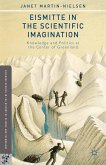This book introduces students to the best recent writings on the Scientific Revolution of the sixteenth and seventeenth centuries.
- Introduces students to the best recent writings on the Scientific Revolution of the sixteenth and seventeenth centuries.
- Covers a wide range of topics including astronomy, science and religion, natural philosophy, technology, medicine and alchemy.
- Represents a broad range of approaches from the seminal to the innovative.
- Presents work by scholars who have been at the forefront of reinterpreting the Scientific Revolution.
Dieser Download kann aus rechtlichen Gründen nur mit Rechnungsadresse in D ausgeliefert werden.
"A well-selected and thoughtful collection of some of the most important recent articles on the Scientific Revolution. This volume will provide a welcome and much-needed tool for introducing readers to this important period." Alix Cooper, SUNY-Stony Brook
"Rumors that the Scientific Revolution is 'dead' belie its staggering resilience. Hellyer s volume insists that something significant happened in early modern Europe, something - by whatever name - that speaks to global change as well as 'Modern' and 'Western.' Concise and accessible, the volume draws together excellent secondary sources framed by useful introductions." Robert A. Hatch, University of Florida
Hellyer s choice of material is well conceived, coherent and admirably presented: a reader can ask for no more." International Journal of the Classical Tradition
"Rumors that the Scientific Revolution is 'dead' belie its staggering resilience. Hellyer s volume insists that something significant happened in early modern Europe, something - by whatever name - that speaks to global change as well as 'Modern' and 'Western.' Concise and accessible, the volume draws together excellent secondary sources framed by useful introductions." Robert A. Hatch, University of Florida
Hellyer s choice of material is well conceived, coherent and admirably presented: a reader can ask for no more." International Journal of the Classical Tradition









